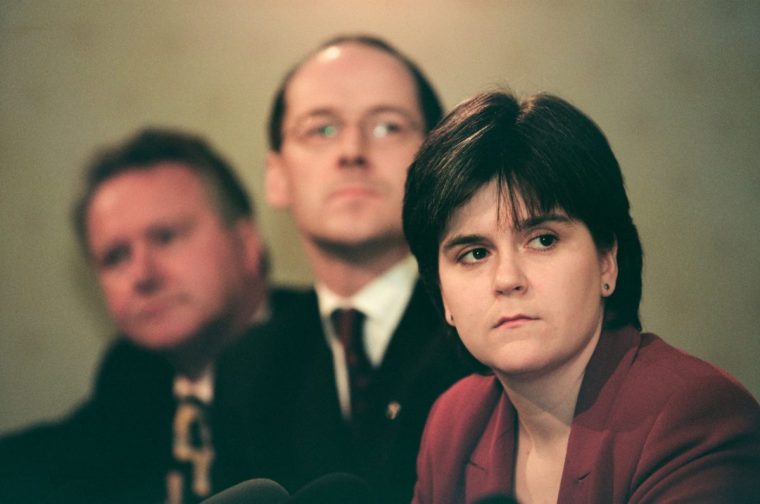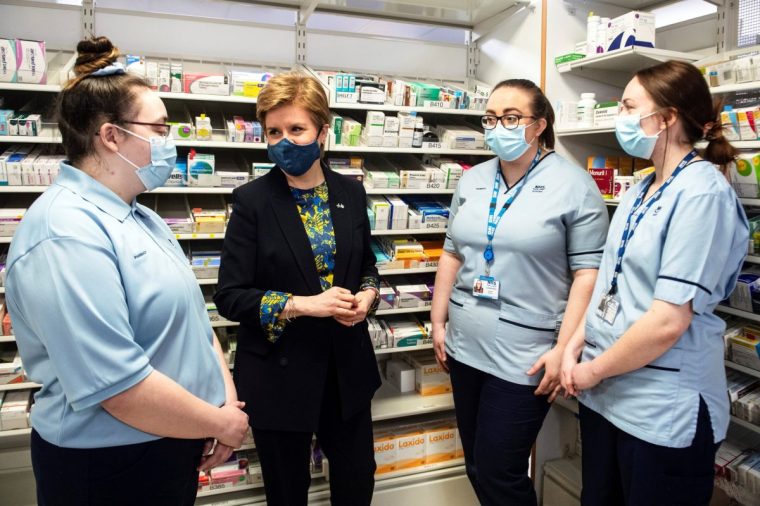The former Scottish First Minister’s book is intensely candid about her mistakes and complicated love life
I met Nicola Sturgeon years ago at the Borders Book Festival in Melrose, soon after she had become Scotland’s First Minister. We were both speaking at the festival. She was dressed casually and seemed light and breezy. I blurted out: “Oh My God, I think I have a crush on you.”
She laughed, but I was mortified. How did I say something so crass to a leader of one of our nations? Another speaker overheard our exchange and whispered to me: “You do know her marriage is a sham?”
I said that was nobody’s business. The speaker spitefully hissed “some journalist” and walked away.
Until then, I had only ever seen images of Sturgeon in skirts or trouser suits, uniforms also chosen by Hillary Clinton and Angela Merkel. In her excellent memoir, Frankly, Sturgeon tells us why.

“I wasn’t yet confident of my own style or demeanour so tended to mimic those around me – middle aged men mainly,” she writes. “As a result, I developed a very serious and austere persona. It was said that I never smiled. I opted for dark, plain clothes, usually suits.” To desex herself.
Misogynists still sullied her. Some were women. The Daily Mail’s Sarah Vine, after a meeting between Theresa May and Sturgeon, wrote a crude column on who had the better legs.
Vine recently published her own shrill, self-pitying book about being a political wife (of the former Tory MP Michael Gove; they divorced in January 2022). Most reviews mocked or disbelieved her. There is a lesson in that for aspiring political memoirists.
Effective political chronicles stir empathy in readers. Whatever their views on Sturgeon, most readers will be touched by Frankly. I agree with the author Andrew O’Hagan, who has called it “the most insightful and stylishly open memoir by a politician since Barack Obama’s Dreams From My Father”.
The book is both intimate and momentous. Sturgeon – ambitious and flawed – traverses through turbulent times in recent Scottish and UK political history and makes them come alive. Through the pages, she is intensely self-critical and candid about her inner struggles, her self-doubt, guilt about mistakes made, her loyalty to undeserving male mentors and her complicated love life.
I read a lot of political memoirs and can say this with some authority: unlike Sturgeon does here, most writers project themselves as self-assured and strong, noble and misjudged. More men than women write political dairies and recollections. Too many of them are mediocre chaps who heroise their pasts. Vanity is unequally divided between genders. The exception is Liz Truss. But let’s not go there.
David Cameron, in For the Record, doesn’t get just how his lax and dilettante stewardship damaged this country. Brief moments of regret are swept away by justifications and spin. He was, apparently, “too honourable”.
Boris Johnson’s Unleashed, packed with his trademark verbal artifices, is utterly unreliable and galling. Matt Hancock’s Pandemic Diaries, a response to critics of his coronavirius “strategy”, provoked only fury.
Rory Stewart is a rare creature. He is an Etonian and ex-Tory with soul and integrity. His memoir, Politics on the Edge, is painfully honest about how unqualified most Tories were for the offices they were given: “We collectively failed to respond adequately to every major challenge of the past 15 years.” There are moments of self-loathing and real angst.

Sturgeon is similarly, unsparingly truthful about the Scottish National Party, British politicians and herself. She does keep some of her secrets about her personal relationships, and is sometimes taciturn and wary. After such a tumultuous life, the caution is entirely understandable.
How did a working-class girl from Ayrshire become the first female First Minister of Scotland? Sturgeon introduces us to the young girl who became the woman who got to the peak of politics – a dangerous, at times, lacerating climb. And yet, she writes, “even at the top of my political powers, the toughest battle I would face was with the voice in my head telling me I was not good enough”.
That anxiety must have been amplified by bullies in the press, the Scottish Parliament and House of Commons. They really loathed this woman and her spirit. Her mum, Joan, only 18 when Nicola was born, became seriously ill during the delivery. After her two daughters were old enough, she became a cashier at a petrol station, then a NHS lab assistant and later, a councillor.
Sturgeon’s father, Robin, was an electrician. They lived in the attic belonging to her mum’s aunt Jean in Dreghorn, a former mining village, and later moved to a terraced council house.
One grandfather was a gardener who worked for a mansion-owning wealthy family, the Mortons. The job came with The Croft, a small house where their kids were raised. But when her grandad died, the Mortons sold The Croft and her gran became homeless.
That experience, she says, “lit something in me that shaped my outlook on life”.
She had the seriousness in her, but Sturgeon also had fun – boyfriends and first kisses, lovely teen mates, who thought she studied too much. By then, she accepted that she was “different” and used that to give herself “an air of mystery”.
When she was 16, she became an activist in the SNP, which was calling for independence and espousing social democratic values. It was her first step into Scottish politics, which thereafter consumed her and, at the end, almost destroyed her, as she was forced to deal with the pandemic, the controversy around her gender recognition reforms, and the inquiry into the Scottish Government’s handling of sexual assault allegations against her predecessor Alex Salmond.
As a young activist, she was noticed by Salmond. He was both brilliant and devious; charismatic and manipulative. She doesn’t spare him or herself. It is an excoriating testimony.
The SNP was viperish and beholden to that one man. He played her and she did not stand up to him because his patronage was important. She made some bad turns. But didn’t get off the road. In 1999, she was elected to the Scottish Parliament.
In 2015, the SNP won a landslide victory. It was a heady time. Sturgeon had a new lover, much older than her, with two children from a previous marriage, who did not want to be a father again. She was relieved. That driven Nicola troubles her now: “I had a burning ambition to succeed in politics but wasn’t yet comfortable in my own skin.”

The dramas of Scotland’s devolution, the vote for independence, the British Government’s duplicities, andthe Scots’ rage and disappointment when the UK left the European Union are eloquently covered in the book. So too the intricate, at times dishonourable games played by SNP insiders. And the extraordinary part she played in all those histories.
Sturgeon was exemplary during the Covid crisis, and is admired by many of us for her belief in equality for all, including transgender people. That led to a massive movement against her leadership and brought her much anguish. In 2023, she resigned. Yet, after she left office, she was voted the most popular leader in the UK.
The collapse of her personal life was seemingly unanticipated. She had married Peter Murrell, then the chief executive of the SNP in 2010. She had a miscarriage soon after that – which she relives in searing detail.
In 2025 the marriage was over. The couple were accused of embezzlement. The media coverage was merciless. She was not charged. His trial is ongoing.
This must be why key material is withheld. It had to be. Most conspicuously missing are details of how her marriage fell apart or the divorce, which is summarily dealt with.
Had they grown apart? Was she worried about getting caught up in his business affairs? Was theirs a marriage destroyed by politics? How upsetting was all that?
This woman does not overshare. But she can write openly and wonderfully about the personal and the political. I now have an even bigger crush on her.
